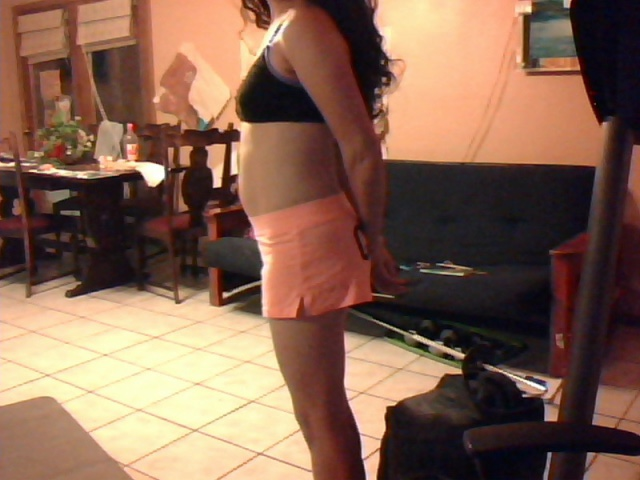Low calorie diets and starvation mode
Question
QUESTION: If an individual who has a normal BMI wants to lose weight but still stay in the normal BMI range,would a low calorie diet work? Being a 26 year old, 5'5" female, I used to eat right around 1200 calories but have gotten down to 300 calories a day (no exercising). I know this isn't healthy, and I want to get back up to the 900-1000 calories I was eating earlier last week. I don't want to gain the weight that I have already lost (about 10 lbs) but I've heard that I will since my body is most likely in starvation mode right now. Is there anyway to get out of starvation mode without gaining the weight back?
ANSWER: Dear Amy,
I have news for you, dear: 1200 calories IS a low calorie diet.
At your height, your ideal weight (125#), and age your body needs 1800-1900 calories for maintenance.
You could well have been in starvation mode on the 1200 calorie level, which is why you had to virtually stop eating to lose weight.
I'm concerned that you may be on the verge of an eating disorder: it doesn't make sense to think that 300 calories is good for you--there is no way to get the protein, vitamins, and other nutrients you need in less than about 1200 calories. My guess is that your desired weight is well below what healthcare practitioners consider ideal.
A healthy weight-reduction diet is one the dieter is able to maintain for a long time while staying healthy. It doesn't sound like you've been doing this. I would like to suggest you see a health professional who can work with you more closely and guide you to the right calorie level that would keep you happy and healthy at the same time :)
I would love to hear how this works out, so please do keep in touch.
---------- FOLLOW-UP ----------
QUESTION: Thanks for responding to my question, but I don抰 understand. For as long as I can remember being weight conscious (5th grade), I always thought 1200 calories was a healthy number. I usually could maintain my weight, but occasionally it would creep up only to eventually go back down. Anything more than 1200, I definitely gained ?not just on the scale but also the way my clothes fit.
I know something inside me knows that eating only 300 calories isn抰 healthy, but I can抰 imagine eating 1800-1900 calories a day. I mostly eat fruits, veggies, lean meat, whole wheat bread/bars, and occasionally, an egg or two to get some more protein. I also take a multi-vitamin so that my body does get the nutrients I need. I抳e never been a fan of milk, and so it抯 one of the few ways I get my calcium since I rarely eat cheese or yogurt. I抎 have to be constantly eating to get that much inside me, not to mention the stomach pain I抎 have. That抯 like eating a whole pizza and then some!
I have to admit I was bit angry/scared when you suggested that I might be on the verge of an eating disorder. And I don抰 understand how you can even say that I might be on the verge of an eating disorder. I most certainly don抰 binge/purge or exercise excessively, I抦 still eating, my BMI (20.0) is in the normal range, and would still be in the normal range even if I lost another 10 pounds. And that抯 not likely to happen since any sign of weight loss has come to a halt. I抦 not looking to become stick thin, just lose another 5 pounds to get to 115 and maintain it.
I抦 sure the only way I抣l get there is if I start eating more, but it抯 hard. I don抰 want to gain the weight back that I抳e already lost and even if I didn抰 care, I抦 not hungry. The hunger pains that I occasionally felt earlier last week have literally vanished. I probably could go the whole day without eating if I wanted to but I don抰; I force myself to eat at least one or two nutrient dense meals. The only side effect I抳e noticed recently is trouble sleeping.
I suppose I could go see a health care professional but where would I even begin? What would I say? And what would be the likely outcome?
ANSWER: Dear Amy,
I am very sorry to have upset you, and I'm glad you decided to write me again.
The truth is, every time in the past (and there have been dozens) that a young lady writes to me and sounds like she is having problems with weight and eating and I suggest she may be flirting with an eating disorder, they have written me back and told me, yes, they do or yes they did and they are recovering, or yes--but I don't want my parents to know.
But I would be happy to admit I am wrong when I am!
I'm glad you don't binge or purge or exercise excessively, but you do have a very low calorie intake and it's not healthy (and I'm glad to hear you are taking vitamins!)
Look at this webpage and see what you think: http://skwigg.com/id8.html
There are many types of eating disorders--orthorexia is one people live with for a very long time. Besides the problem of not getting enough nutrition there is an uncomfortable preoccupation with eating/not eating, weight, appearance and other thoughts that end up running your life and making you less happy than you could be otherwise.
On the other hand, there is a chance that you are erroneously calculating calories, and what you believe to be 1200 is actually 1600 (I have seen this happen many times in the past--but it's more doubtful now with all the resources available for accurately counting calories).
First I would suggest you see your regular physician if you have one and let him know you have been eating a low calorie diet; perhaps keep a food diary for a week to show him exactly what you usually eat, especially if it is 300 calories per day. If a doctor writes you an order to see a dietitian it is most often covered by your health insurance. Most local hospitals have dietitians who can see you as an outpatient... you just go to the hospital and they talk with you for about an hour in their office, answering to your questions and concerns. I believe this would be the best way for you to get answers to your questions, accurate information, and put you on the best track for your future.
Do not hesitate to write me again with any questions or concerns--I would be happy to help in any way I can!
---------- FOLLOW-UP ----------
QUESTION: Laurie,
I went ahead and looked at the website you provided for me. I didn't think that I have orthorexia, but I went ahead and took the quiz anyway. Truthfully, I found it hard to definitively answer yes or no to half of the questions. Maybe you can help me sort through them based on my thoughts/feelings.
Q1: The only time I really think about food is when I'm thinking about what I'll allow myself to eat that day, when I'm preparing and eating the food, or when I get a craving for something that I can't let myself eat. I don't think this amounts to more than 3 hours though. So I answered no. ?!?
Q2: I can't necessarily say that I plan tomorrow's food today, but I do make sure I have the right foods ready to eat in the correct portion size (e.g. cook a bunch of chicken breats at once, measure foods and put them into containers to be eaten later). So I answered no. ?!?
Q3: This a definitive no. :)
Q4: This seems to be a bit of an oxymoron for me since in all senses, the quality of my diet has decreased instead of increased. I don't know if I can say my quality of life has diminished but I have noticed that I've become a little bit more irritable and sometimes, I just want to be left alone. So I answered no.
Q5: Definitive no. :)
Q6: No, but I do see myself checking restaurant websites or other internet sources to determine what foods are safe for me to order and how such foods fit into my daily menu. For example, my fmaily is taking my grandma out for her 80th Bday next week. I've already checked the website and have decided that I can order a plain chicken breast and a small house salad. That way, I can still eat a little fruit if I get hungry before supper. I answered no. ?!?
Q7: I don't feel an increased sense of self-esteem when I'm eating healthy food nor do I look down on those who don't, but I do feel a sense of accomplishment when I restrain from eating more than what I allow or any temptations. So I answered no. ?!?
Q8:I answered yes because I would feel guilty if I even took a bite of any unsafe food or when I'd be unable to restrain from eating over my daily limit. I haven't REALLY felt that way though because I live on my own and only buy what is safe. Out of sight, out of mind idea.
Q9:I answered no because I still participate in all my usual activities even though my eating habits in such environments have begun to change - graciously decline, lie that I just ate/not hungry, or plan ahead as mentioned in Q6.
Q10: Definitely yes. I definitely feel more control of my life when I eat the way I'm supposed to. I even feel this way when I see my weight has declined, and feel out of control if it goes up.
So if I tally up my score, I answered yes twice; implicating that I have at least a touch of orthorexia. This doesn't make sense to me because I gather that orthorexia involvesan individual strictly focusing on the nutritional value of what they are eating to the extreme. I really don't care that what I'm eating has X or Y vitamins/minerals. I choose them because A) they are low in calories and B) I know exact amount of calories per serving. I never buy or eat anything before knowing exactly how many calories are in each serving of said food.
I'd really like to have as much info. and understanding of what I'm going through before I see a physician. I haven't seen my family doctor since I had pneunomia 11 years ago, and am not sure how comfortable I feel talking to a male doctor about any of this. Keeping a food diary won't be any trouble since I already keep one to monitor how many calories I eat throughout each day. I also track my weight twice a day - when I wake up and before I go to bed. so since I'd prefer to see a female doctor, is it fine to just choose any one whose services are covered under my insurance?
I know I've asked a lot already in this response but what is most likely happening to my body right now? A few websites say that once in starvation mode, which can take 3-4 weeks to recover from, your body begins consuming your muscles first, then your organs, and lastly, any fat tissue you have. Is this true? Could I already be forcing my body to consume my organs?
As days progress, get more and more fearful of what is going on. Any advice would be much appreciated. BTW, I've lost another pound since my first question.
Hi Amy,
I appreciate how thoughtful you were in filling out answers to the orthorexia quiz. The basis of this condition as opposed to other eating disorders is that people are focusing on only eating healthy food instead of focusing on their body image and fearing they will become fat.
It sounds like you have some features from a few different types: you do seem preoccupied with your weight, such as weighing yourself twice a day, feeling out of control when there's a change, trying to keep your calorie level severely restricted; you use terms like "unsafe" food and "what I am allowed to eat" and this just shows a preoccupation with food and weight and eating that is a little more intense than most people have.
It would be fine to choose any physician you are comfortable with.
When your body doesn't get enough calories it turns to the fat stores first for calories!
Since there is no way to manufacture protein in the body, if there isn't any in the diet the body can't replace the constant use of protein tissues. First the blood protein levels will deplete and it's likely a person would get sick more often (hemoglobin, white blood cells, albumin and other blood protein levels decrease); then the body will try to use what it can from the muscles, because they are more dispensable than the organs. And lastly the organs are reduced in size because they can't be maintained with no protein intake--this takes a very long time and people can live with very little food intake for many years. Finally, the heart and kidneys cannot do their job when they are too small and the person will die.
But starving to death is different from "starvation mode". When a person has a low calorie intake for a long time, the body adapts and finds a way to continue on while burning fewer calories. This can last for many years. There are theories that people who are constantly dieting are messing up their metabolism. As an answer to this, many modern diets have a flux of low-calorie days and high-calorie days to keep the metabolism from decreasing and staying there.
I would love to hear from you when you find out any information from a local health care practitioner. I think you will be much happier when some of these dieting issues get resolved for you!
Related Articles
-
what foods should I eat?
QuestionHi I am a 23 year old female and I just started to take u
-
Weight loss question....
QuestionHello Rost, I am obese (not morbi
-
Starvationmode
QuestionHow do you lose weight fast while your body is in Starvat
-
Last 10 lbs.
QuestionHello Laurie, I have gone from 165 to 129 in about 9 mon
-
health & weight loss
QuestionThank you so much for your time,patience(all my questions
-
breakfast & eggs
QuestionDear Sir 1. Whats the best way to have eggs? Boiled or a



